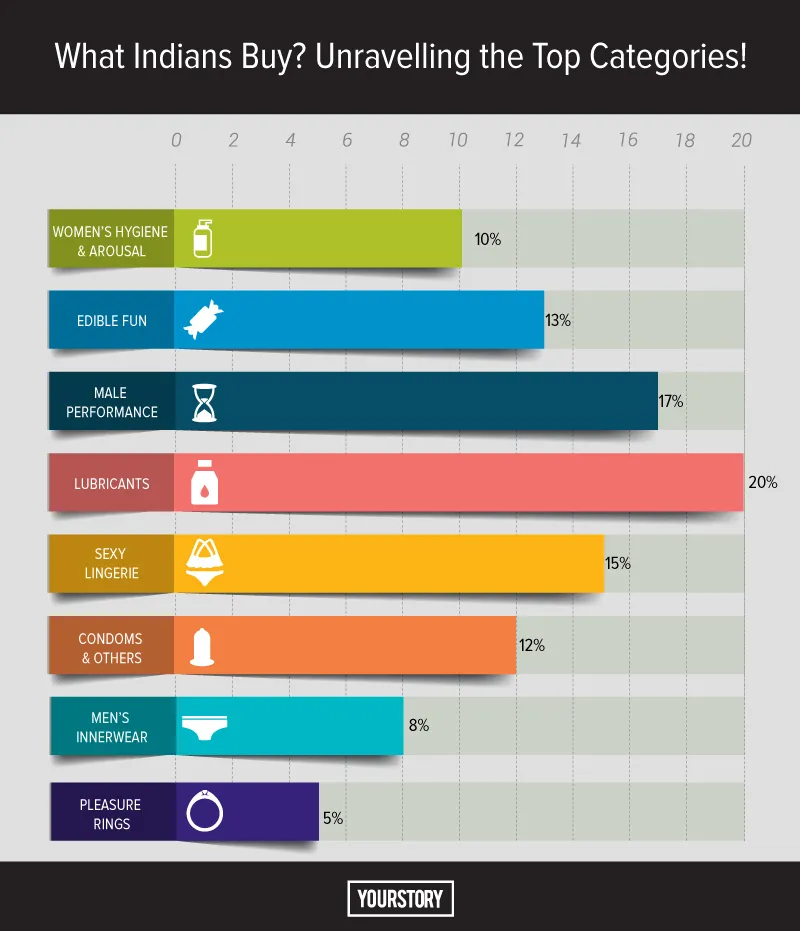There's one aspect that often gets pushed under the bed in all the talk about a digital society. How it will impact sex. The tech boom, as we found is leading to a lot of boom, boom.
For NRI businessman Raj Armani waiting at the Customs queue at Indian airports is not new. At one time, a sensitive shipment of his was detained at Delhi Customs. “All through the negotiations, there was an undertone of moral indignation with which the customs official was dealing with me,” says Raj recalling some of his early experiences in his business.
As founder of one of India’s premier e-commerce sites for adult products, IMbesharam, this was also not new to Raj. “There was no missing the fact that he was judging me. He told me in not so many words that I was hurting the sentiments of the people.” The sensitive shipment in question was an adult sex toy that the Customs official thought was obscene and hence illegal to be imported here.
“Finally, he agreed to release the shipment only if I could furnish a doctor’s prescription stating that the product was for the use to overcome certain sexual malfunctions.” That, and a small gesture of leaving a ‘sample’ for the good official’s use.

Incidents like these sure take the fun out of running an adult products business in India, but the huge potential that India as a market presents to Raj and a number of other new-age e-commerce businesses trumps everything else. “The sexual wellness market will soon be worth more than Rs 10,000 crore, and we’ve not even explored 10 percent of it,” he tells me over a long distance call from LA.
Long-distance love
For the past two years, however, certain products have sailed through the moral and legal hurdles at the Customs. And one wonders what the officials will have to say when they find out what these can do?
Kiiroo, billed as a revolutionary product in the adult sex toys category, allows couples to feel each other from anywhere in the world. It comes in nondescript packaging and can easily pass off as a compact music speaker. There are two components to it -- Onyx for the man and Pearl for the woman -- each Bluetooth-enabled. They can communicate directly when connected to the Kiiroo video chat app. “You can give and receive pleasure from a partnered toy,” the product description says.

Raj’s e-commerce site IMbesharam.com has sold 130 units of these in the past two years. The entire set costs upwards of Rs 50,000. There are other WiFi-enabled sex toys manufactured in Europe and the US that are the next big thing in the love industry. Lovense, another such brand but less expensive, costs around Rs 19,999, and Raj says they have sold 200 units in the past six months.
Other sites like Samir Saraiya’s that’spersonal.com and Reetinder Singh’s Kinkpin.in also retail sex tech toys. Add to that those who probably buy directly from the manufacturer’s websites and those who pick them up during their visits abroad, and you do get a number that reveals there are people who have either heard about them or used them.
“Being in a long-distance relationship I would love to purchase a WiFi-enabled sex toy. It would make my time with sex toys more pleasurable. Nothing like controlling our sex toys via phone,”
says a 27-year-old professional from Mumbai working as an undergraduate enrollment advisor in the education industry. She prefers to buy online and has gifted friends who got married this year, especially those whose husbands are in the Army and Navy. She shops upwards of Rs 5,000 going up to as much as Rs 10,000, and says if the sex tech product falls in the range she is willing to buy one.
It is not hard to see why Indians will not warm up to the idea of 'teledildonics' and use their high-priced smartphones to give and receive pleasure to a lover sitting miles away from them. We’ve adopted Tinder all right. And if the numerous sexual surveys are to be believed, the millennial population has shed its baggage of prudery and is open to experimenting with love.
Land of the Kama
Consider this 2016 India Today survey: 75 percent of Indians from Guwahati and Patna to Mumbai believe sex is an important part of a relationship. Sixty-four percent ranked their sex drive as "high", while 71 percent rated their partner’s performance as “good” and 55 percent said they were “adventurous” in bed.

It is this segment that Samir caters to. “So far, we’ve entered the bedrooms of more than 961 cities and towns! E-commerce boom boom?” states his business plan to any potential investor who might be interested. Incidentally, they are bootstrapped. Investors are yet to rise up to the occasion considering the high-risk appetite in this segment.
Awarded the most innovative startup of the year, That’spersonal’s highest single customer order has been for Rs 1.47 lakh, and its most expensive gift hamper has been picked up for Rs 99,001.
Despite family disapproval, Samir started his adult web store in January 2013, and says he was sold out by February 14, Valentine’s Day, the next month. His company is the sole distributor of 32 international brands and they also sell them on other e-commerce sites like Flipkart, Snapdeal, and Amazon, as well as to offline stores.
In recent times, he has sold Kiiroo, We-Vibe, and other international brands that manufacture IoT-enabled sex toys.
New York-based Lovense that manufactures wearable sex tech products is watching the Indian market closely. In an e-mail exchange, its marketing manager, Eddy Olivares, tells me, “I believe India is on the verge of being ready (for the next generation of sex toys). India's a unique country where the majority of the population jumped online but bypassed the step of widespread computer use (like in every home). The culture shift is more like China as opposed to the more gradual shift in the US or other countries. Given what we've seen happen in China, I think the change in behavior regarding IoT acceptance in India will be drastic -- sex is going to be just another aspect of that drastic shift in behavior.”
According to him, “It's (teledildonics) more likely to be accepted as opposed to going through a stage where it's considered weird or strange. That's my prediction, at least, our sales will help determine if my intuition is correct. We'll be keeping a close eye on Indian sales in the next couple years to confirm my theory!”

In 2008 and 2009, the founder of Lovense was in a long-distance relationship and felt disconnected sexually to his partner, which gave him the idea to launch the company’s first toy, Remote Pleasure. It was a very simple vibrator that used Skype to control the vibrations. He sold that first toy essentially as a hobby. In 2013, he revisited the idea and launched what the company claims to be the world's first 'bi-directionally controlled' sex toys under the Lovense brand.
“My colleague and I have visited various parts of India before and know a bit about the culture. The lack of alone time young couples get with partners is a void we anticipate to fill with our technology! Additionally, there are lots of long distance couples that can benefit from using our products to close the intimacy gap they experience,” Eddy says.
The company is working on four new products: a bullet vibrator, a wand, a prostate massager and a g-spot toy. “The bullet vibrator is shaped like no other bullet on the market. We really looked into the customer pain points and developed a design that significantly improves the traditional shape. For our wand, we used unique technology which makes it as powerful as other wands twice its size. The prostate massager is the world's first adjustable one (and also the world's first Bluetooth one). The gspot toy is the first to provide pinpoint gspot stimulation, using oscillating technology,” he elaborates the company’s plan, adding that all these products will be available for the Indian market soon. It is also interested in exploring the sex robot space.
Shop for fun

The global adult products market size is estimated at Rs 1,05,000 crore, growing at an annual rate of 30 percent. Interestingly, the Indian e-commerce sites catering to the adult market has seen an increase in the women shoppers. “At this time, we have about 38 percent of shoppers as women. When we went live (in 2013), we saw 70:30 male:female ratio in traffic but sales were 87:13 from the same visitors. Now, the trend has moved to 64:36 ratio in terms of traffic,” says Raj, a self-styled merchant of Kamasutra, who moved to the US early and has been a serial entrepreneur since.
The company recently tied up with adult actor Sunny Leone as its brand ambassador, and its maximum demand comes from metros followed by Tier I cities.

The general consensus among people in the business is that “people’s perceptions are changing from the adult or erotic positioning to more of sexual health and wellness.”
Samir says his prediction for 2017 is that the year will see a lot of innovation around sex tech, especially virtual reality, saying that he foresees product innovations coming from startups rather than large players in the industry.
In a recent interview he did with a European erotic trade magazine Ean, Samir said he believed that technology will take sex toy personalisation to a new level, and personalisation will soon become a new mantra for brands. “We are not too far away from the day when strangers will be having cybersex with each other, with privacy, using these products, in the comfort of their homes while physically being in different locations. I honestly believe it will be good for society and add to the general sexual well-being of people.”
Protection must
However, before we reach that utopian condition, as it were, there are many and more pitfalls of this tech boom (eh, boom, boom). Recently, the We Vibe 4 software was hacked raising questions of user data protection.
As with all things digital, cyber security and data protection should remain a top priority over even sexual urges.
According to media reports, a lawsuit was filed against WeVibe’s parent company, Standard Innovation, alleging that it was collecting personal information like the time spent on the device, speed and intensity of the vibrator, battery life and other details -- data that could perhaps be used for product iterations.
Lekesh Dholakia, legal counsel to Samir’s company, however, says that any user on a social digital platform, whether it is Facebook or WhatsApp, by default agrees to hand over their personal data, and that the sex tech platform is no different.

“We gather very basic data for troubleshooting- and as little as possible. Even if we are hacked, the way we have designed our system, you cannot really get any personal information. Or attach some sensitive information to a specific person,” claims Eddy of Lovense, when quizzed about his company's steps to protect customer data.
For India, though, the legal issues are more around the outdated laws that govern the import of sex toys. Often there are huge import duties levied on them, which, as I understand, is borne by the e-commerce platforms.
The primary law governing this issue is Section 292 of Indian Penal Code (IPC), where the word 'obscenity' takes precedence. What that means is that such e-commerce platforms cannot import any products that resemble human parts and those that have similar images on the packaging.
Pune-based legal counsel Ashish Porwal says the IoT-enabled sex toys, in addition, may also attract the provisions of the Information Technology Act, 2000, if there occurs a breach of privacy or a hacking into the IoT environment.
But what if the device falls into the hands of a stranger? Will it amount to rape? “No,” he says, because rape defined in Section 375 of IPC specifies sexual intercourse as one of the key elements. As Samir adds, “It takes two hands to clap. One can’t use force here to get the other person to clap.”
Sex tech is no doubt becoming a talking point. In a country where 'sex' is the most searched word on the Internet and porn the most consumed (all hush, hush of course), talking about the issue is a good starting point.
When Samir went to his conservative relatives' home for the first time after his wedding, he was tongue-tied when asked what he did for a living. “I was apprehensive of telling them that I run an adult e-commerce store,” he tells me. But he needn’t have feared. “Once the young cousins found out, they were excited and during my entire visit I was fed with suggestions on how to improve the collection.” We may not talk, but we know. It’s for nothing that 'we are like this only.'







